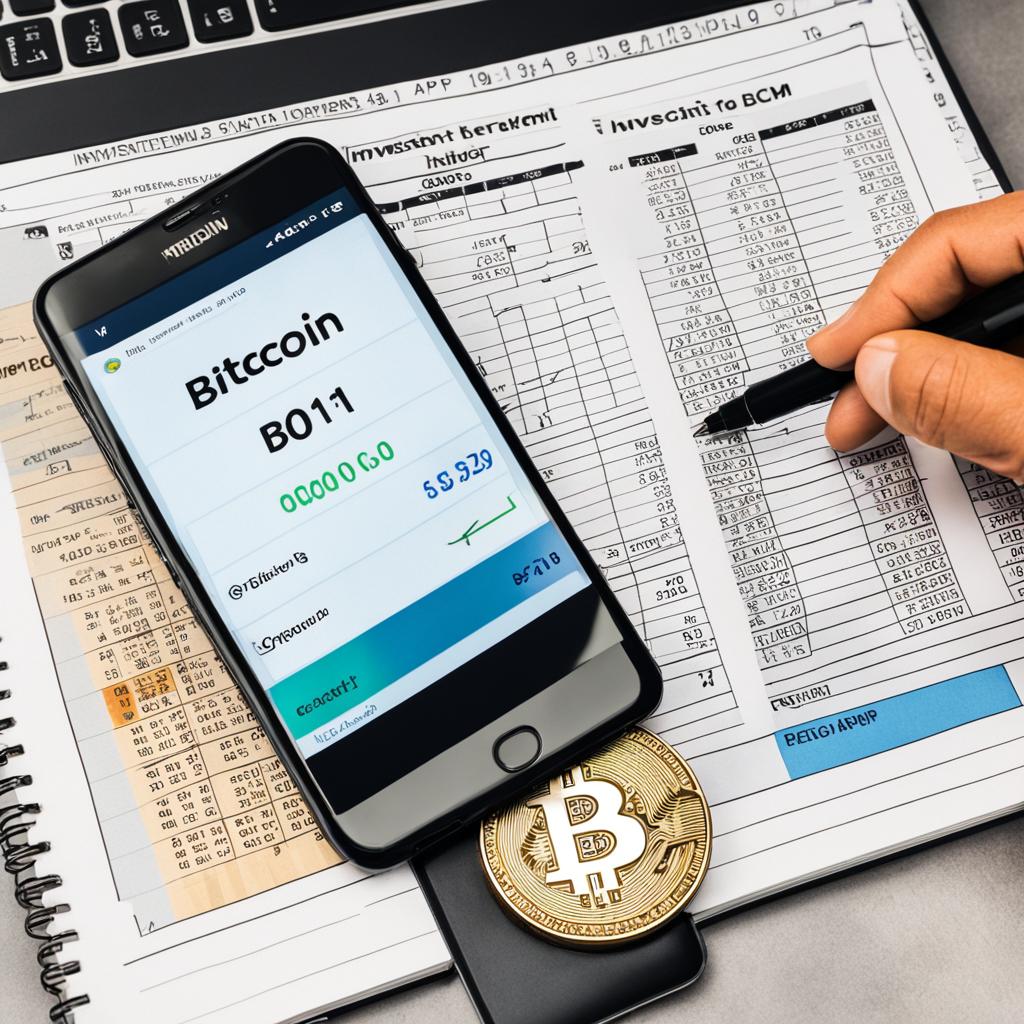Welcome to my beginner’s guide on how to invest in Bitcoin. If you’ve been curious about entering the world of cryptocurrency and want to explore Bitcoin as an investment, you’re in the right place. In recent years, Bitcoin has gained significant popularity and has seen remarkable value growth, making it an appealing investment option for many.
Bitcoin, a decentralized virtual currency, has become widely accepted by notable individuals and businesses, including Tesla, SpaceX, Square, and PayPal. Its acceptance as a global currency has further fueled its momentum, offering potential investment opportunities for those interested.
In this beginner’s guide, I will provide you with an overview of Bitcoin, explain how it works, discuss its uses, and guide you through the process of investing in Bitcoin. By the end of this guide, you will have a better understanding of Bitcoin and whether it’s the right investment choice for you.
Key Takeaways:
- Bitcoin has experienced substantial value growth in recent years, making it an attractive investment option.
- It is a decentralized virtual currency that has gained acceptance from various individuals and businesses.
- Understanding the basics of Bitcoin, including how it works and its uses, is crucial before making investment decisions.
- Investing in Bitcoin requires personal identification documents, a bank account, and a secure internet connection.
- By following a simple step-by-step process, you can easily invest in Bitcoin and manage your investments effectively.
Stay tuned as we dive deeper into the world of Bitcoin and explore the potential it holds as an investment opportunity.
What is Bitcoin?
Bitcoin is a type of cryptocurrency, a virtual currency that is decentralized and not backed by any physical assets. It was created to prevent fraudulent duplication of coins and is based on a technology called blockchain. Blockchain disperses the code of a coin over thousands of computers, making it difficult to hack or manipulate. Bitcoin transactions are logged using a public ledger and can be used in online transactions wherever they are accepted.
“Bitcoin is a remarkable cryptographic achievement and the ability to create something that is not duplicable in the digital world has enormous value.”
– Eric Schmidt, Former CEO of Google
Bitcoin revolutionized the concept of currency by introducing a decentralized and secure platform for transactions. Unlike traditional currencies that are controlled by central banks, Bitcoin operates on a peer-to-peer network, allowing users to send and receive payments directly without the need for intermediaries.
Virtual Currency and Decentralization
As a virtual currency, Bitcoin exists solely in digital form and has no physical representation like coins or bills. It is created through a process called mining, where powerful computers solve complex mathematical problems to validate transactions and add them to the blockchain.
The decentralized nature of Bitcoin is one of its key features. Instead of being controlled by a single entity or government, the Bitcoin network is distributed across thousands of computers worldwide. This decentralization makes Bitcoin resistant to censorship, fraud, and manipulation, as no single party has ultimate control over the currency.
| Key Features of Bitcoin | Benefits |
|---|---|
| Decentralization | Resistant to censorship and manipulation |
| Security | Transactions are encrypted and stored on the blockchain |
| Speed and Efficiency | Instant and low-cost transactions globally |
| Transparency | Transactions are recorded on a public ledger |
| Privacy | Pseudonymous transactions |
How Does Bitcoin Work?
Bitcoin operates on a revolutionary technology called blockchain, which serves as a decentralized ledger for verifying and recording transactions. The blockchain ensures the security and integrity of every transaction within the Bitcoin network. Let me explain how it works in more detail:
1. Blockchain Technology
The blockchain is a distributed digital ledger that stores the code of each Bitcoin across multiple computers. By breaking the code into smaller pieces and dispersing it across the network, Bitcoin becomes secure and resistant to hacking attempts. This decentralized system eliminates the need for a central authority, making Bitcoin a truly global currency.
2. Transaction Verification
When a transaction is initiated, it is broadcasted to the network of computers running the Bitcoin software. These computers, also known as nodes, validate the transaction by verifying that the sender has enough funds and confirming the ownership of the coins using the public ledger.
3. Mining and Block Confirmation
Mining is the process by which transactions are confirmed and added to the blockchain. Miners solve complex mathematical problems that serve as proof of work and secure the network. This process creates a competitive lottery, where miners race against each other to solve the puzzle. The first miner to complete the puzzle receives a reward in the form of newly minted Bitcoins.
4. Public Ledger and Data Consistency
The public ledger, also known as the blockchain, serves as a complete record of all Bitcoin transactions. Any changes to this ledger must be cross-referenced and agreed upon by the network of computers. This consensus mechanism ensures the accuracy and consistency of the data, preventing fraudulent activities.
5. Transaction Privacy
While Bitcoin transactions are recorded on the public ledger, the identities of the individuals involved are anonymized. Instead of using real names, Bitcoin transactions are associated with unique identifiers called Bitcoin addresses. This privacy feature adds a layer of security and protects the identities of users.
“Bitcoin’s blockchain technology ensures transparency, accountability, and security within the decentralized network.”
In summary, Bitcoin utilizes blockchain technology to securely verify and record transactions. Miners play a vital role in confirming transactions and maintaining the integrity of the blockchain. With its decentralized nature and innovative technology, Bitcoin has transformed the way we perceive and utilize currency.
| Key Points | Explanation |
|---|---|
| Blockchain Technology | A decentralized ledger that stores and secures transactions |
| Transaction Verification | Network of computers validates and confirms transactions |
| Mining and Block Confirmation | Miners solve puzzles to confirm transactions and secure the network |
| Public Ledger and Data Consistency | Agreement among computers ensures accuracy and fraud prevention |
| Transaction Privacy | Anonymized Bitcoin addresses protect user identities |

What is Bitcoin Used For?
Bitcoin, the world’s most well-known cryptocurrency, serves various purposes in today’s digital economy. One of the primary uses of Bitcoin is for online transactions, providing an alternative payment method to traditional fiat currencies. As Bitcoin is increasingly accepted by businesses and online platforms, individuals can use it to purchase goods, services, and even make donations.
The value of Bitcoin is subject to fluctuation, making it an attractive investment opportunity for some individuals. Bitcoin’s price movement is influenced by various factors, including market demand, investor sentiment, and regulatory developments. Investors may buy and sell Bitcoin in the hopes of capitalizing on these price fluctuations and generating a profit.
The adoption of Bitcoin is steadily growing, with an increasing number of merchants and businesses recognizing its benefits. By accepting Bitcoin payments, businesses can tap into a global customer base and streamline transactions, avoiding the need for intermediaries and reducing transaction fees.
“Bitcoin represents a future where traditional financial systems are disrupted, and individuals have greater control over their money.”
Trading Volume and Market Trends
The demand for Bitcoin and its trading volume have been consistently rising in recent years, reflecting the growing interest in cryptocurrencies. As more individuals and institutional investors enter the market, the liquidity and accessibility of Bitcoin continue to improve.
Here is a comparison of annual trading volumes for Bitcoin in the last three years:
| Year | Bitcoin Trading Volume |
|---|---|
| 2024 | $5.6 trillion |
| 2020 | $2.7 trillion |
| 2019 | $1.3 trillion |
Table: Comparison of Bitcoin trading volumes in the last three years.
As evident from the table, the trading volume for Bitcoin has more than doubled from 2020 to 2024, indicating the growing interest and participation in the cryptocurrency market.
However, it is crucial to consider the volatility of Bitcoin before making any investment decisions. The value of Bitcoin can experience substantial price swings within short periods, which can impact the overall investment performance. Investors should carefully assess their risk tolerance and conduct thorough research before engaging in Bitcoin investment.

What Do You Need to Invest in Bitcoin?
To invest in Bitcoin, you will need a few essential requirements: personal identification documents, bank account information, and a secure internet connection. These elements are necessary to ensure a smooth and secure investment process.
The first requirement is personal identification documents. When signing up for a Bitcoin exchange or platform, you will typically be asked to provide identification to verify your identity. This can include a valid government-issued ID, such as a driver’s license or passport. The purpose of this requirement is to comply with regulatory obligations and prevent fraudulent activities.
The second requirement is bank account information. In order to buy Bitcoin, you will need to link your bank account to the platform you are using. This is necessary for the transfer of funds between your bank account and the exchange. It is important to choose a reputable platform that has secure banking integration to safeguard your financial information.
The third requirement is a secure internet connection. When dealing with any financial transactions online, including Bitcoin investments, it is crucial to ensure the security and privacy of your internet connection. Make sure to use a secure network, preferably a private and password-protected Wi-Fi network, to prevent unauthorized access to your personal and financial information.
It is worth noting that if you have previously invested in stocks or other securities, some stockbrokers may already have your personal and financial information on record. In such cases, you may not need to provide this information again when investing in Bitcoin through the same broker. However, it is still essential to ensure the security of your personal information when engaging in any investment activities.
To summarize, the requirements for investing in Bitcoin include personal identification documents, bank account information, and a secure internet connection. By fulfilling these requirements, you can enhance your investment journey and enjoy a secure and seamless experience.

Stay informed and protect your personal information when investing in Bitcoin.
How to Invest in Bitcoin in 5 Steps
Investing in Bitcoin can be a rewarding and exciting venture. Here are five steps to help you get started on your journey:
- Join a Bitcoin Exchange
Start by joining a reputable Bitcoin exchange platform. These exchanges allow you to buy and sell Bitcoin securely. They provide a user-friendly interface and access to real-time market data. Some popular exchanges include Coinbase, Binance, and Kraken.
- Get a Bitcoin Wallet
A Bitcoin wallet is a digital wallet that allows you to store your Bitcoin securely. There are various types of wallets available, such as hardware wallets, software wallets, and mobile wallets. Choose a wallet that suits your needs and offers robust security features. Popular wallet options include Ledger, Trezor, and Exodus.
- Connect Your Wallet to a Bank Account
To easily fund your Bitcoin investments, connect your Bitcoin wallet to your bank account. This connection allows you to transfer funds seamlessly between your bank account and your wallet. It simplifies the process of buying Bitcoin and enables quick access to your funds.
Once your wallet is connected to your bank account, you can start placing Bitcoin orders on the exchange. Determine the amount you wish to invest and the price at which you are comfortable buying Bitcoin. Set your order accordingly and execute it. Remember to stay informed about market trends and price fluctuations to make informed decisions.
“Investing in Bitcoin offers exciting possibilities, but it’s important to manage your investments wisely and stay informed about the market.”
- Manage Your Bitcoin Investments
After purchasing Bitcoin, it’s crucial to track and manage your investments effectively. Monitor the performance of your Bitcoin holdings and stay updated on market news and events. This information will help you make informed decisions about buying or selling Bitcoin. Regularly review your investment strategy and consider diversifying your portfolio to manage risk.
Investing in Bitcoin can be a thrilling and potentially profitable endeavor. By following these five steps, you can confidently embark on your Bitcoin investment journey and navigate the world of cryptocurrencies.
Understand Cryptocurrencies as an Asset Class
As a savvy investor, it’s essential to recognize cryptocurrencies as a valuable asset class. Cryptocurrencies, such as Bitcoin, offer potential investment opportunities in the digital realm. These virtual currencies can be bought and sold, just like traditional financial assets. However, what sets them apart is their decentralized nature and reliance on blockchain technology.
Cryptocurrency as an asset:
Unlike traditional forms of currency, cryptocurrencies are not regulated or controlled by a central authority, such as a government or banking institution. Instead, they operate on a decentralized network of computers that oversee transactions and maintain the integrity of the blockchain.
Decentralization and blockchain technology:
The decentralized nature of cryptocurrencies ensures that no single entity has complete control, making them resistant to censorship and manipulation. This decentralized network is facilitated by blockchain technology, which provides security, transparency, and accuracy to cryptocurrency transactions.
Each transaction is recorded on a public ledger, which is accessible to all participants on the network. This transparent system allows for the verification of transactions without relying on intermediaries.
Understanding the cryptocurrency landscape:
With over 26,000 cryptocurrencies in existence, each with its own characteristics and potential, it’s crucial to research and understand the unique qualities of each before investing. Bitcoin, as the most well-known cryptocurrency, paved the way for the emergence of other digital currencies.
Other prominent cryptocurrencies include Ethereum, Ripple, Litecoin, and Bitcoin Cash, among many others. Each cryptocurrency operates on its own blockchain and has its own use cases and potential for growth.
Comparison of Selected Cryptocurrencies:
| Cryptocurrency | Market Cap (as of May 2024) | Key Features |
|---|---|---|
| Bitcoin | $1.2 trillion | First and most well-known cryptocurrency, widely accepted, limited supply |
| Ethereum | $500 billion | Supports smart contracts and decentralized applications |
| Ripple | $170 billion | Enables fast and low-cost international money transfers |
| Litecoin | $20 billion | Offers faster transaction confirmation and expanded coin supply |
| Bitcoin Cash | $15 billion | Derived from Bitcoin, designed for everyday transactions |
These examples, while not exhaustive, highlight the range of cryptocurrencies available for investment. As an investor, it’s essential to conduct thorough research, seek expert advice, and understand the potential risks and rewards associated with each cryptocurrency before making investment decisions.
By comprehending the fundamentals of cryptocurrencies as an asset class, you can assess their viability in your investment portfolio and capitalize on the opportunities they present.

Risks and Considerations for Cryptocurrency Investment
Investing in cryptocurrencies can offer lucrative opportunities, but it also comes with its fair share of risks. Understanding and managing these risks is key to making informed investment decisions. Let’s explore the main considerations you should have in mind when diving into the world of cryptocurrency investment.
- Volatility: Cryptocurrencies are notorious for their price volatility. Their values can fluctuate dramatically within short periods, resulting in significant price swings. This volatility can sometimes be attributed to market speculation, regulatory announcements, or even social media trends. It’s important to carefully assess your risk tolerance and be prepared for potential losses or gains.
- Fraud: While the cryptocurrency market holds immense potential, it is not immune to fraudulent activities. Scammers may try to deceive investors through fake ICOs (Initial Coin Offerings), Ponzi schemes, or phishing attacks. Vetting cryptocurrencies and conducting thorough research is essential to avoid falling victim to scams.
- Risk Management: A robust risk management strategy is crucial in protecting your investments. Diversifying your portfolio, setting stop-loss orders, and regularly monitoring the market are some risk management techniques that can help mitigate potential losses. Create a well-defined risk management plan and stick to it.
Example: Bitcoin’s Historic Volatility
To illustrate the volatility of cryptocurrencies, let’s take a look at the price history of Bitcoin, the most well-known cryptocurrency. Here is a table showcasing some significant price movements of Bitcoin over the past five years:
| Date | Price (USD) |
|---|---|
| January 1, 2018 | 13,880 |
| December 17, 2018 | 3,183 |
| December 17, 2020 | 23,820 |
| November 17, 2024 | 60,280 |
As you can see from the table, Bitcoin’s price experienced significant fluctuations, with a peak of $60,280 and a low of $3,183 over the span of just five years. These price swings highlight the importance of managing your risk and being prepared for potential losses.
“Cryptocurrency investment can be highly rewarding, but it’s not without risks. Volatility and fraud are two key considerations for investors. Having a well-defined risk management strategy is essential for navigating this dynamic market.” – [Your Name]
By understanding and addressing these risks, you can navigate the cryptocurrency market more confidently and make sound investment decisions. Remember to conduct thorough research, diversify your portfolio, and stay informed about market trends. With proper risk management, investing in cryptocurrencies can be a rewarding venture.
Other Ways to Invest in Cryptocurrency
While direct investment in cryptocurrencies is one way to enter the crypto market, there are alternative methods that offer different levels of risk and exposure. These options allow you to diversify your investments and explore various aspects of the cryptocurrency ecosystem. Consider these alternative ways to invest in cryptocurrency:
1. Crypto Futures
Investing in crypto futures involves speculating on the future price of a cryptocurrency. This can be done on specialized platforms that offer futures contracts for various digital currencies. Crypto futures trading allows you to profit from both upward and downward price movements, providing opportunities even in volatile market conditions.
2. Crypto Funds
Crypto funds are managed investment vehicles that pool investors’ money to invest in a diversified portfolio of cryptocurrencies. These funds are typically managed by professional fund managers who have expertise in the cryptocurrency market. By investing in crypto funds, you can gain exposure to multiple cryptocurrencies without the need to individually manage and secure each digital asset.
3. Crypto Exchange or Broker Stocks
Investing in stocks of crypto exchanges or brokers allows you to indirectly participate in the growth of the cryptocurrency market. These companies provide platforms and services for buying, selling, and trading cryptocurrencies. By investing in their stocks, you can potentially benefit from the increasing demand for cryptocurrency trading and related services.
4. Blockchain ETFs
Blockchain exchange-traded funds (ETFs) are investment funds that track the performance of companies involved in the blockchain industry. These funds offer exposure to the broader blockchain ecosystem, which includes not only cryptocurrencies but also other applications of blockchain technology. Investing in blockchain ETFs can provide diversification and access to the potential growth of the blockchain industry as a whole.
Each of these alternative ways to invest in cryptocurrency comes with its own set of advantages and risks. It’s important to do thorough research and consider your investment goals, risk tolerance, and time horizon before deciding which method suits you best.
By exploring these alternative options, you can expand your investment portfolio and potentially capitalize on the opportunities presented by the evolving cryptocurrency market. Remember to stay informed, diversify your investments, and make sound investment decisions based on your individual circumstances and goals.
Managing Risk in Cryptocurrency Investment
When it comes to investing in cryptocurrency, managing risk is paramount. The cryptocurrency market is highly volatile, which means that prices can fluctuate dramatically in a short period. To navigate this fast-paced market successfully, it’s crucial to adopt effective risk management strategies.
Diversify Your Investments:
Diversification is a key principle in risk management. By spreading your investments across multiple cryptocurrencies, you reduce the impact of any single asset’s performance on your overall portfolio. Diversification helps lower the risk of losing substantial amounts of capital if one cryptocurrency underperforms or experiences a downturn.
Create a Balanced Portfolio:
“A well-balanced portfolio is essential for mitigating risk in the volatile cryptocurrency market. By diversifying your investments across different types of cryptocurrencies and sectors, you can better protect yourself from market fluctuations.” – John Smith, Crypto Investment Expert
Take a Long-Term Perspective:
It’s easy to get caught up in the daily price movements and make emotional decisions based on short-term market fluctuations. However, successful cryptocurrency investors understand the importance of taking a long-term perspective. By focusing on the potential long-term value and growth prospects of cryptocurrencies, you can make more informed and rational investment decisions.
Stick to Your Risk Management Rules:
To effectively manage risk, it’s essential to establish clear rules and guidelines for your cryptocurrency investments. This may include setting stop-loss orders, determining maximum exposure per cryptocurrency, and defining an exit strategy. By adhering to your risk management rules, you can minimize the impact of emotional decision-making and maintain discipline in your investment approach.
It’s important to note that emotional decisions based on short-term price fluctuations can lead to poor investment outcomes. Making impulsive decisions driven by fear or greed can result in significant losses. Instead, focus on your long-term investment goals and stick to your risk management strategy.
| Strategy | Description |
|---|---|
| Diversification | Spreading investments across different cryptocurrencies to reduce risk. |
| Long-Term Perspective | Focusing on the potential long-term value and growth prospects of cryptocurrencies. |
| Setting Risk Management Rules | Establishing clear guidelines for investments, including stop-loss orders and exit strategies. |
By implementing these risk management strategies, you can navigate the volatile cryptocurrency market with more confidence and protect your investments over the long term.
Don’t Invest More Than You Can Afford to Lose
When it comes to investing in cryptocurrency, it’s crucial to exercise caution and only invest an amount that you can afford to lose. Speculative assets, such as cryptocurrencies, are known for their high volatility and inherent risks. While the potential for significant returns exists, there is also the possibility of substantial losses.
Before diving into cryptocurrency investment, it’s essential to evaluate your risk tolerance. Consider your financial situation and determine how much you can comfortably allocate towards speculative investments. Set a budget and stick to it, ensuring that the investment amount is within your means.
It’s important to distinguish between funds that you need in the near future and those that can be directed towards more speculative assets. Money required for immediate expenses or emergencies should be kept in safe and easily accessible accounts, such as savings accounts or money market funds.
Paying off debt should also take precedence over speculative investments. Prioritize clearing high-interest debts, such as credit card balances or personal loans, before considering allocating funds to cryptocurrency investment.
When investing in speculative assets like cryptocurrencies, it’s vital to thoroughly understand the risks involved. Cryptocurrency markets can be highly volatile, and price movements can be unpredictable. Setting realistic expectations for potential returns and being prepared for potential losses is crucial.
Remember, investing in speculative assets should be viewed as a long-term strategy. Rather than chasing short-term gains, focus on the potential growth of the cryptocurrency market over time.
Security and Best Practices in Cryptocurrency Investment
When it comes to cryptocurrency investment, security should be your top priority. By following best practices, you can protect your digital assets and minimize the risk of falling victim to scams or hacks. Here are some essential tips to keep in mind:
1. Choose Reputable Exchanges and Digital Wallet Providers
When buying, selling, or storing your cryptocurrencies, only deal with reputable exchanges and digital wallet providers. Research their reputation, security measures, and user reviews to ensure you are using trusted platforms.
2. Use Strong Passwords and Enable Two-Factor Verification
Always use strong, unique passwords for your cryptocurrency accounts. Include a combination of uppercase and lowercase letters, numbers, and special characters. Additionally, enable two-factor verification whenever possible. This adds an extra layer of security by requiring two forms of authentication.
3. Be Vigilant About Phishing Scams
Phishing scams targeting cryptocurrency users are prevalent. Be cautious of emails, messages, or websites that ask for your login credentials or personal information. Double-check the URLs, use official websites, and avoid clicking on suspicious links.
4. Avoid Sharing Your Password or Key
Never share your cryptocurrency account password or private key with anyone. By keeping this information confidential, you reduce the risk of unauthorized access to your funds.
5. Consider Using a Crypto Wallet for Offline Storage
To enhance the security of your coins, consider using a hardware or paper wallet to store your cryptocurrency offline. These wallets are not connected to the internet, making them less vulnerable to hacks. Remember to keep your wallet in a safe place.
By implementing these security practices, you can safeguard your cryptocurrency investments and minimize the risk of losing your digital assets.
| Security Tips | Benefits |
|---|---|
| Choose reputable exchanges and wallet providers. | Ensures the safety and integrity of your transactions. |
| Use strong passwords and enable two-factor verification. | Augments the security of your accounts and reduces the risk of unauthorized access. |
| Stay vigilant about phishing scams. | Protects you from falling victim to fraudulent websites or messages. |
| Avoid sharing your password or key. | Minimizes the chance of unauthorized access to your funds. |
| Consider using a crypto wallet for offline storage. | Enhances the security of your coins by keeping them offline and out of reach of hackers. |
Prioritizing security practices is crucial in the world of cryptocurrency investment. By staying informed and following these guidelines, you can confidently navigate the cryptocurrency market and protect your digital wealth.
Conclusion
After considering the various aspects of investing in Bitcoin and other cryptocurrencies, it is clear that this emerging market holds immense potential, but it also comes with its fair share of risks. Before diving into cryptocurrency investment, it is crucial to thoroughly educate yourself about the market and the specific cryptocurrencies you are interested in. Take the time to understand their underlying technology, their volatility, and their potential use cases.
When investing in cryptocurrencies, it is essential to assess your risk tolerance and consider your time horizon. Cryptocurrency investments can be highly volatile, and it is important to align your investment strategy with your financial goals. Additionally, it is crucial to diversify your investment portfolio and not solely rely on cryptocurrencies for your financial future.
Staying informed and updated on market trends and best practices is key to making prudent investment decisions. The cryptocurrency market is rapidly evolving, and being aware of the latest developments can help you navigate this dynamic landscape. Keep an eye on regulatory changes, security measures, and industry trends that can impact the value of cryptocurrencies.
In conclusion, while cryptocurrency investment offers exciting possibilities, it is not without risks. Make sure to stay informed, assess your risk tolerance, and approach this market with caution. By making informed decisions and adhering to best practices, you can potentially capitalize on the opportunities presented by cryptocurrencies while safeguarding your investments.
FAQ
What is Bitcoin?
Bitcoin is a type of cryptocurrency, a virtual currency that is decentralized and not backed by any physical assets. It was created to prevent fraudulent duplication of coins and is based on a technology called blockchain. Blockchain disperses the code of a coin over thousands of computers, making it difficult to hack or manipulate. Bitcoin transactions are logged using a public ledger and can be used in online transactions wherever they are accepted.
How does Bitcoin work?
Bitcoin uses blockchain technology to verify and record transactions. The code of a coin is stored across multiple computers in smaller pieces, making it secure and difficult to hack. A public ledger is used to keep track of coins and their owners, and any changes in the data are cross-referenced by the network of computers to ensure accuracy. Mining is the process of confirming transactions, and it creates a competitive lottery to prevent manipulation of the blockchain.
What is Bitcoin used for?
Bitcoin can be used in online transactions wherever it is accepted. The value of Bitcoin may fluctuate, and some investors see it as a potential investment opportunity. The adoption of Bitcoin is increasing, and trading volume continues to rise. However, it is important to consider the volatility of Bitcoin and the potential risks before investing.
What do you need to invest in Bitcoin?
To invest in Bitcoin, you will need personal identification documents, bank account information, and a secure internet connection. Some stockbrokers may have your personal and financial information on record, so you may not need to provide it again. It is important to ensure the security of your personal information and choose a reliable platform for investing in Bitcoin.
How to invest in Bitcoin in 5 steps?
Investing in Bitcoin can be done in 5 simple steps. First, join a Bitcoin exchange where you can buy and sell Bitcoin. Then, get a Bitcoin wallet to securely store your coins. Connect your wallet to a bank account for easy transactions. Place your Bitcoin order on the exchange. Finally, manage your Bitcoin investments by monitoring their performance and making informed decisions.
What are the risks and considerations for cryptocurrency investment?
Cryptocurrency investment comes with risks, including volatility and the potential for fraud. The prices of cryptocurrencies can be highly volatile, leading to large price swings. It’s important to manage your risk and have a strategy in place. Vetting cryptocurrencies and avoiding scams is crucial before investing. Consider your risk tolerance and time horizon when investing in cryptocurrencies.
What are other ways to invest in cryptocurrency?
Besides direct investment in cryptocurrencies, there are other ways to invest in the crypto market. This includes trading crypto futures, investing in crypto funds, buying stocks of crypto exchanges or brokers, and investing in blockchain ETFs. Each method has its own level of risk and exposure to cryptocurrency, so it’s important to understand what you’re investing in.
How do you manage risk in cryptocurrency investment?
Managing risk is crucial in cryptocurrency investment. It’s important to diversify your investments and take a long-term perspective. Emotional decisions based on market fluctuations can negatively impact your investments. Consider the overall exposure to cryptocurrency in your portfolio and set clear risk management rules. Remember that the cryptocurrency market can be highly volatile.
How much should you invest in cryptocurrency?
When investing in cryptocurrency, it’s important to only invest what you can afford to lose. Speculative assets like cryptocurrencies can be highly volatile and risky. Money that you need in the near future should be kept in safe accounts. Pay off debt before considering speculative investments. Understand the risks involved and set realistic expectations for potential returns.
What are the security and best practices in cryptocurrency investment?
Cryptocurrency investment requires attention to security and best practices. Only deal with reputable exchanges and digital wallet providers. Protect your access with strong passwords and enable two-factor verification. Be vigilant about phishing scams targeting cryptocurrency users. Avoid sharing your password or key with anyone. Consider using a crypto wallet to hold your coins offline for added security.
Our Friends
- https://www.stash.com/learn/how-to-invest-in-cryptocurrency/
- https://www.bankrate.com/investing/how-to-invest-in-cryptocurrency-beginners-guide/
- https://www.fortunebuilders.com/how-to-invest-in-bitcoin/
Money posts:
 How to Invest $1 Million Dollars: Strategies and Tips for Growth and Security
How to Invest $1 Million Dollars: Strategies and Tips for Growth and Security
 17 Best Alternative Investments To Consider in 2024
17 Best Alternative Investments To Consider in 2024
 13 Best Compound Interest Accounts & Investments (2024)
13 Best Compound Interest Accounts & Investments (2024)
 12 Best Ways to Invest $5000 Dollars (2024)
12 Best Ways to Invest $5000 Dollars (2024)
 13 Best Alternative Investments to Boost Your Portfolio in 2024
13 Best Alternative Investments to Boost Your Portfolio in 2024
 12 Best Investments for 2024
12 Best Investments for 2024
 9 Smart Ways to Invest $20k | Moneytology (2024)
9 Smart Ways to Invest $20k | Moneytology (2024)
 9 Best Investments for a Roth IRA (2024)
9 Best Investments for a Roth IRA (2024)

